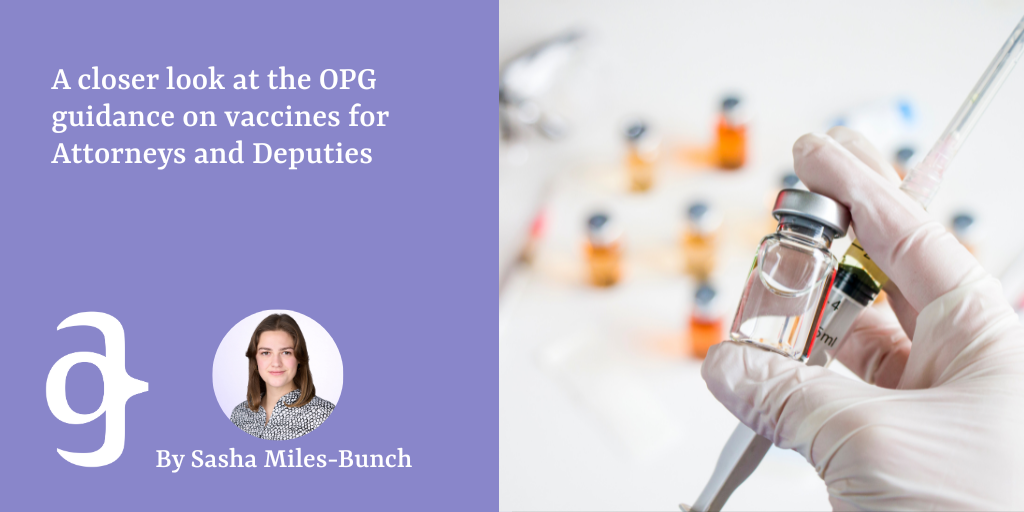A closer look at the OPG guidance on vaccines for Attorneys and Deputies

On 28 June 2023 the Office of the Public Guardian (OPG) published specific guidance on vaccines for attorneys and deputies. Vaccines have been a hot topic in recent years further to the COVID-19 pandemic and subsequent vaccination rollout, and no doubt the challenges encountered by those acting as attorneys and deputies during this time, have played a part in the production of this guidance. This blog takes a closer look at the new OPG guidance and the legal principles underpinning it.
At the very outset of the document, the OPG reminds us that capacity is decision specific, and so the first step a deputy or attorney must take is to establish if the person they act for (P) has capacity to consent to vaccination. If they do have the requisite capacity to provide or refuse consent, then no decision can be made on their behalf.
Part two of the guidance goes on to clarify that, just because someone lacks the capacity to consent to receiving a vaccine, this should not stop that vaccine being offered to them. In these circumstances, if P has an attorney or deputy for health and welfare, this person can make the decision on their behalf. There is a clear warning to those who are appointed only as attorney or deputy for property and affairs that their authority does not extend to making decisions about P’s health and welfare, including consenting to a vaccine.
When deciding whether or not to consent to a vaccine on P’s behalf, a health and welfare attorney or deputy must consider whether to do so would be in P’s best interests. All attorneys and deputies should be familiar with section 4 of the Mental Capacity Act 2005, which sets out the procedure to be followed when making a best interests decision, and this procedure is reflected by the OPG in part three of the guidance which addresses how an attorney or deputy should approach making a decision about whether to consent to vaccination on behalf of P.
In particular, the OPG has chosen to highlight in the guidance the importance of considering P’s wishes if they were to be able to make the decision themselves. In particular:
- P’s past and present values, including moral, political, and religious views;
- any other factors P would usually consider if they were able to do so;
- any preferences on P’s health and welfare LPA (if they have provided specific instructions, these are enforceable and must be followed)
A deputy or attorney should not make a decision solely based on P’s age or appearance, or any other assumption based on a condition they have or any aspect of their behaviour. If it is likely that P might regain mental capacity, consideration should be given as to whether it is appropriate to wait to make the decision until they are able to make it themselves.
The final part of the guidance addresses the steps that a Deputy or attorney should take to ensure that they are contacted for a decision about any vaccine that is offered to P. While the healthcare professional or the individual administering the vaccine should consider whether the person concerned has capacity to consent to the vaccine, and establish if there is a relevant LPA or court order in place, the OPG advises that, in order to ensure that the relevant consultation takes place, the deputy or attorney should ensure to contact either the local vaccination team, or, if P is resident in a care or nursing home, the home itself to ensure that they are aware of their appointment.
The guidance advises attorneys and deputies that healthcare professionals will want to know how they have arrived at their decision, and that, if this is contrary to their professional opinion or if an agreement cannot be reached, an application may need to be made to the Court of Protection for determination of the issue.
This new guidance is a reflection of the now well-established principles developed by the body of case law generated by the recent covid-19 vaccination roll out. The prevailing message of the Court has been that each decision about vaccination will be specific to each individual, and it is the interests of the individual in question that should be at the forefront of decision making, not the medical advantages of vaccination, and not the beliefs or concerns held by others. It appears that, by choosing in particular to highlight the importance of considering P’s beliefs and wishes, the OPG is seeking to further embed this person-centred approach into the minds of attorneys and deputies.
* Disclaimer: The information on the Anthony Gold website is for general information only and reflects the position at the date of publication. It does not constitute legal advice and should not be treated as such. It is provided without any representations or warranties, express or implied.*
No comments